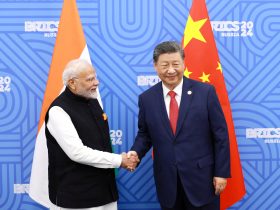A medical employee is taking good care of newborns at Dongfang Hospital in Lianyungang, China, on January 1, 2024.
Costfoto | Nurphoto | Getty Photos
China’s efforts to bolster start charges have but to handle the core causes for his or her speedy decline, in response to analysts.
Though the nation began easing its stringent one-child coverage almost a decade in the past, the start price has continued to plummet, with a file low of 9.02 million newborns final 12 months.
The variety of new marriage registrations additionally plunged by 25% 12 months on 12 months within the third quarter, indicating the overall for the 12 months will drop to six.4 million, the bottom since 1979, in response to monetary providers agency Nomura’s evaluation of official information launched this month.
Reasonably than attempting to induce a sizeable “start spurt,” China’s insurance policies to this point have been extra about “supporting households [and] permitting those that do wish to have a second or third youngster to do that with extra ease and affordability,” stated Lauren Johnston, affiliate professor of China Research Middle on the College of Sydney.
Latest measures are “a small step in a long-run agenda,” she stated.
Chinese language authorities final month introduced high-level plans for subsidies and tax breaks to households with kids underneath the age of three. The measures additionally prolonged maternity go away to 158 days from 98 days. Final 12 months, the nation doubled childcare tax breaks to 2,000 yuan ($280) per 30 days.

Births in China have been on a drastic downward development for the reason that authorities applied its “one-child coverage” nationwide in 1980. The United Nations in July forecast that China, the second most-populous nation on the planet, will possible lose greater than half of its inhabitants by 2100 within the biggest drop of any nation.
The “psychological hangover” from the one-child coverage has lingered and “basically modified younger individuals’s notion of households,” stated Harry Murphy Cruise, economist at Moody’s Analytics. He added that slower financial development has additionally led “younger individuals to second-guess or delay plans to start out a household.”
“It’s an extremely troublesome job [and] there is no such thing as a silver bullet to lifting fertility charges,” stated Cruise.
World Financial institution information confirmed that the fertility price, outlined as births per girl, was 1.2 in China in 2022, under 1.7 within the U.S., which has benefited from a extra open immigration coverage.
China’s share of the world’s stay births is anticipated to drop to round 3% in 2100 from 8% in 2021, in response to Austin Schumacher, an assistant professor of well being metrics sciences on the Institute for Well being Metrics and Analysis, College of Washington.
“Present research on varied pro-natal insurance policies have solely proven modest will increase which our projections present won’t be enough to reverse inhabitants decline,” Schumacher stated. “Nevertheless, with new improvements and analysis into bettering present endeavors and growing new one, it could possibly be attainable.”
An more and more urgent issue for households in China is uncertainty about revenue for elevating a toddler.
After many years of speedy growth, China’s economic system has slowed down, dragged down by an actual property droop. Crackdowns on after-school tutoring, gaming, finance and web platform firms have additionally hit hiring in industries that have been as soon as well-liked with current graduates.
China’s youth unemployment price — measured by these aged 16 to 24 and never in class— rose to a file excessive of 18.8% in August. It edged decrease in September.
“The issue actually is that individuals haven’t got the boldness to make ends meet for themselves, not to mention take into consideration having sufficient to lift kids,” stated Sheana Yue, economist at Oxford Economics.
Measures that “earnestly” increase revenue and alleviate households’ residing prices would “go a great distance” in bettering sentiment round childbearing in China, stated Yue.
Nationwide well being authorities have this 12 months tried to encourage companies to assist maternity go away by emphasizing the availability of state funds to pay feminine staff who give start.
Strain of metropolis life
Students generally have famous the hyperlink between urbanization and falling start charges. About 83% of People lived in cities in 2023, versus 65% in China, in response to World Financial institution figures. That is up from 19% in 1980 — when the U.S. urbanization price was 74%.
The “hectic and traumatic work schedule” in massive cities tends to discourage marriage and births, stated Darren Tay, head of APAC nation danger at BMI. That would “blunt the influence of incentives meant to encourage births.”
The share of China’s inhabitants aged 20 to 39 has already declined, indicating fewer marriages forward, Nomura economists stated.
That is prone to result in fewer births over the subsequent few years, the economists stated, until there’s a “materials change in incentives for married {couples}.” They count on that at an annual parliamentary assembly in March, Beijing might announce as much as 500 billion yuan ($70 billion) in annual spending to spice up births.
Lack of incentives
There seems to be a scarcity of correct incentives aimed toward boosting start charges, whereas sure steps might even encroach on data many societies take into account personal.
As an example, just a few on-line posts this 12 months claimed native social employees in China indiscriminately referred to as ladies asking in the event that they have been pregnant, and pressured them to choose up free folic acid.
The central authorities’s newest coverage duties native authorities with establishing a price range for public childcare facilities and easing the bounds of housing loans for households with a couple of youngster. That leaves implementation as much as native authorities, a lot of which have struggled financially.
Tianchen Xu, senior economist at Financial Intelligence Unit, identified that prior insurance policies to encourage extra births have been “inconsistent and insufficient” relying on native authorities funds and willingness to prioritize the measures.
To show across the falling start charges, China wants “a mix of sturdy direct monetary incentives,” Xu stated, notably subsidies and advantages for housing.







